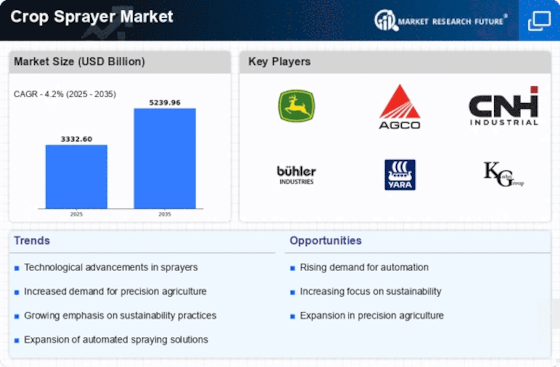Top Industry Leaders in the Crop Sprayer Market

*Disclaimer: List of key companies in no particular order
Top listed global companies in the industry are:
- Chafer Machinery Ltd (UK)
- Zhejiang Ousen Machinery Co. Ltd. (China)
- CNH Industrial (UK)
- Bucher Industries (Switzerland)
- Deere & Company (US)
- Taizhou Sunny Agricultural Machinery Co. Ltd (China)
- Exel Industries (France)
- STIHL Holding AG & Co. KG (Germany)
- Hymatic Agro Equipment Pvt. Ltd (India)
- ASPEE Group (India)
- and Others.
The Tilled Terrain: Navigating the Competitive Landscape of the Crop Sprayer Market
The crop sprayer market, an essential cog in the global agricultural machinery landscape, is teeming with competitive action. As farmers strive for yield optimization and resource efficiency, they seek the most advanced and effective spraying solutions. Understanding the strategies, trends, and factors shaping this dynamic market is crucial for stakeholders seeking to secure a thriving position.
Key Players and their Strategies:
- Industry Titans: Established players like John Deere, AGCO (Fendt, Massey Ferguson), and Kubota leverage their extensive global reach, diversified product portfolios, and brand recognition to maintain market leadership.
- Regional Champions: Companies like Amazone (Germany), Hardi (Denmark), and Jacto (Brazil) hold strong regional footholds by tailoring their offerings to specific crop profiles and farmer preferences.
- Technology Disruptors: Startups like DroneDeploy and PrecisionHawk challenge traditional sprayers with drone-based application technologies, offering targeted spraying and data-driven decision making.
Factors for Market Share Analysis:
- Sprayer Technology: Innovation in nozzle design, application rate control, and boom automation directly impacts efficiency and environmental impact. Companies like John Deere with its ExactApply nozzles and AGCO's FocusAir boom leveling system showcase this focus.
- Machine Intelligence: Integration of AI and sensors unlocks precision spraying capabilities, reducing chemical waste and optimizing application rates based on real-time field data. DroneDeploy's automated flight plans and PrecisionHawk's AI-powered weed identification are examples of this trend.
- Sustainability Focus: The demand for eco-friendly solutions pushes manufacturers to explore alternative fuels, bio-based materials, and reduced-drift technologies. Jacto's electric sprayers and Hardi's focus on precision spraying to minimize runoff demonstrate this commitment.
- Connectivity and Data Management: Integration with farm management software platforms is becoming crucial for seamless data flow, enabling spray application data analysis and performance optimization. Companies like AGCO with its Fuse platform and PrecisionHawk's data analytics suite are at the forefront of this shift.
Emerging Trends and Company Strategies:
- Robotic Sprayers: Automation is expanding beyond drones, with companies like Naio Technologies in France developing autonomous ground-based sprayers for precise and efficient application.
- Variable Rate Application (VRA): Advanced sensors and data analysis capabilities enable targeted spraying based on crop health, soil conditions, and pest pressure, optimizing chemical use and maximizing yield. Amazone's AmaSelect system and John Deere's ExactRate technology exemplify this trend.
- Subscription and Service Models: Offering flexible service packages and data-driven spraying recommendations is gaining traction, allowing farmers to access technology without upfront investment and optimize their operations.
- Partnerships and Collaborations: Partnerships between sprayer manufacturers, technology providers, and agricultural businesses are fostering innovation and accelerating market penetration. For instance, John Deere's collaboration with drone manufacturer Auterra for spraying solutions demonstrates this collaborative approach.
Overall Competitive Scenario:
The crop sprayer market is a dynamic and complex landscape, fueled by technological advancements, evolving farmer needs, and sustainability concerns. Success hinges on adapting to these trends, embracing data-driven solutions, and fostering partnerships that enhance value propositions. Established players must retain their brand strength and adapt to technological shifts, while disruptors need to demonstrate the economic viability and scalability of their offerings. Mastering these challenges will determine who thrives in the fertile yet competitive terrain of the crop sprayer market.Latest Company Updates:
October 2023- Robotics Plus, the New Zealand-based agritech company, has introduced Prospr, a multi-use, hybrid, and autonomous vehicle engineered to execute a selection of vineyard and orchard crop tasks more economically and sustainably whilst reducing dependence on labor. Prospr is at present commercially available from Robotics Plus, an expert in the design and manufacture of innovative agricultural robotics. Prospr lodges several swappable tools being progressed, such as newly introduced tower sprayers for grapes, tree crops, or apples. The perfect device for the job is connected to the vehicle, relying on the day's work, and numerous Prosprs can work together in a fleet to get the job done. The autonomous vehicle utilizes a blend of insight systems to sense the environment, allowing data-driven insights. The company will demonstrate Prospr for the first time at FIRA 2023 in the first week of October, a California-based event devoted to autonomous agriculture and agricultural robotics solutions. The co-founder and chief executive at Robotics Plus, Steve Saunders, says the agriculture industry encounters extraordinary challenges as this generation operates to generate more food sustainably while lowering emissions and supplying at a lesser cost. He further added that the Prospr is a strong autonomous vehicle, using all-day running, that alters the jobs grower's requirement to do while lowering inputs, emissions, and dependence on increasingly hard-to-find machine operators. The company has emphasized the use and flexibility with an extraordinary modular architecture, enabling various tools for different crop types and applications year-round to enhance return on investment.










